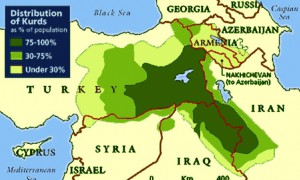
The below report by Patrick Cockburn, one of the best reporters now covering the Middle East, describes the growing tensions in Iraq over the question of sharing its oil wealth among its constituent regions. Although his report is important in its own right, its contents become even more ominous when they viewed in a larger historical context:
The long view of history is likely to record the greatest ‘sins' of Iraq, Iran, and Libya prompting interventions by the West have been related to the control of oil — not nuclear weapons; not any communist leanings during the Cold War; not support of worldwide terrorism.
Each country committed the unforgivable sin of being governed at one time by nationalistic leaders who believed the oil under each country belonged to that country and should be controlled by the government of that country — therefore, these leaders had to be removed:
- Iran – Mohammed Mosaddegh, a popularly elected Prime Minister of Iran and social reformer, removed by a CIA/MI6 coup in August 1953.
- Iraq – Saddam Hussein, a murderous neo-Stalinist dictator and social reformer (e.g., major achievements in women's rights and education), removed by military force in 2003.
- Libya – Muammar Qaddafy, a quirky tribal dictator and social reformer (e.g., major achievements in women's rights and education) removed by military force in 2011.

One short-term common denominator in these imposed regime changes was that the nationalist leader was replaced by a more compliant government that agreed to an opening of that country's oil fields to exploitation by privately owned western oil companies.
While history does not repeat itself, memories of the past condition events in the future. Over the longer term, perceived wrongs are not forgotten, and such interventions can provoke blowbacks, which in turn provoke counteractions that enmesh the intervener in a welter of increasingly complicated conflicts. In the case of Iran, for example, the 1953 coup eventually backfired in 1979, when Reza Shah Pahlavi was overthrown by the Islamic revolution led by the Ayatollah Khomeini. Khomeini then established a regime retook control of Iran's oil fields, among other things. But the Iranian game is not over, and the historical pattern of move and countermove is in play, with the nationalist (Islamic) regime of Iran again in the West's crosshairs, allegedly because of its nuclear ambitions and support of international terror. Nevertheless, the glittering temptations of re-privatizing Persian oilfields are lurking in the background, attracting the private oil capitalists of the West like flies to honey.
Finish long comment from Spinney, plus reference, plus See Also.
It is too early to tell if or how blowback will unfold in Libya or Iraq, and the histories, cultures, and current conditions in these countries are very different from those in Iran. The privatization of Libya's oil fields is just beginning. On the other hand, as Cockburn points out, a process of divide-and-conquer privatization is well underway in Iraq; and it is already creating its own peculiar problems.
Furthermore, in Iraq, the potential for a regional blowback from the privatization of Iraq's oilfields is complicated by the unique detritus left over from the destruction of the Ottoman Empire, including the hypocritical colonialist assumptions implicit in 1919 Versailles Treaty, the empty promises of Woodrow Wilson's 14 Points, and the nationalist assumptions implicit in the 1923 Treaty of Lausanne (summary & text) which established the boundaries for the modern Turkish nation (a fait accompli imposed on the Allies by the stunning military accomplishments of Kemal Ataturk, and in so doing, he (1) nullified the cynical Anatolian partition plan envisioned by the Allies in their stillborn 1920 Treaty of Sèvres and (2) forced the British to renege on their promise to give the Kurds an independent nation in what is now southeastern Turkey, among other things).
I am speaking of the still unresolved Kurdish Question [see map below and interested readers will find an excellent historical summary here].
The 20 million or so Kurds are probably the world's largest ethnic group without a nation. While they are by no means unified, and their nationalist aspirations and minority rights have been ignored since the Treaty of Lausannne nullified the question of statehood, sometimes quite viciously, especially in the areas now encompassed by eastern Turkey and northern Iraq. The 2003 invasion of Iraq unleashed those ambitions once again. But this time, they are being fueled by the oil wealth described by Cockburn. The emergence of an economically viable Kurdish nationalism changes the separatist game fundamentally and threatens to spill over to destabilize and provoke violent reactions in Turkey as well as Iraq — and perhaps even Iran and Syria.
If there is one thing the Wars of the Yugoslavian Succession ought to have taught the sclerotic elites shaping US foreign policy in the post-cold war era, it is that breaking up an ethnically diverse country previously held together by an iron hand does not necessarily improve protections of minority rights. Just ask the Serbs in Northern Kosovo who have roots roots in the region reaching back a thousand years.
My guess for the future of Iraq and its immediate environs: We ain't seen nuttin yet.
Exxon's Deal with the Kurds Inflames Baghdad
The oil giant has defied Iraq's government by signing up to drill in disputed territory
by Patrick Cockburn
Independent, 9 December 2011
The great Iraqi oil rush has started to exacerbate dangerous communal tensions after a major oil company ignored the wishes of the central government in Baghdad and decided to do business with its main regional rival.
Phi Beta Iota: Several books brilliantly pertinent to the colonized regions are:
Review: The Health of Nations–Society and Law beyond the State
Review: The Lessons of History
Review: The Unconquerable World–Power, Nonviolence, and the Will of the People
Review: Wars of Blood and Faith–The Conflicts That Will Shape the 21st Century



